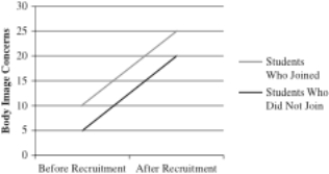Dr. Fletcher is interested in understanding whether joining a fraternity/sorority causes people to become more concerned about their attractiveness and appearance. He recruits a group of 55 freshmen (25 males, 30 females) who are planning to go through fraternity/sorority recruitment on his campus. After they join, he gives them a measure of attractiveness concern/appearance concern (the Body Concern Scale, where higher scores indicate higher body concerns).
In addition to measuring the group of participants who joined a fraternity/sorority, Dr. Fletcher decides to give the same measure to another group of 55 participants who decided to not join a fraternity/sorority. Based on the results below, explain whether Dr. Fletcher should be concerned about a maturation threat to internal validity.

Definitions:
Routine and Rituals
Established sequences of actions regularly followed; rituals often carry symbolic meaning and are practiced to establish order, tradition, or cultural significance.
Cognitive-Behavioral Therapy
A form of psychotherapy that treats problems by modifying dysfunctional emotions, behaviors, and thoughts.
Self-Stimulatory Behaviors
Repetitive movements or actions often performed for sensory feedback, commonly observed in individuals with autism.
Incessantly Flapping
A continuous and repetitive motion of flapping, often used to describe bird wings or human gestures indicating distress or excitement.
Q1: Armand conducts a study for his research
Q3: A uricosuric is drug that decreases the
Q3: Dr. Elder was interested in the way
Q6: Synergistic effects result when two drugs administered
Q8: Dr. Lonsbary is a cognitive psychologist who
Q9: The classification of drug most commonly used
Q36: Dr. Lonsbary is a cognitive psychologist who
Q48: Why is the statistical validity of a
Q54: Which of the following is true of
Q66: Which of the following is true of